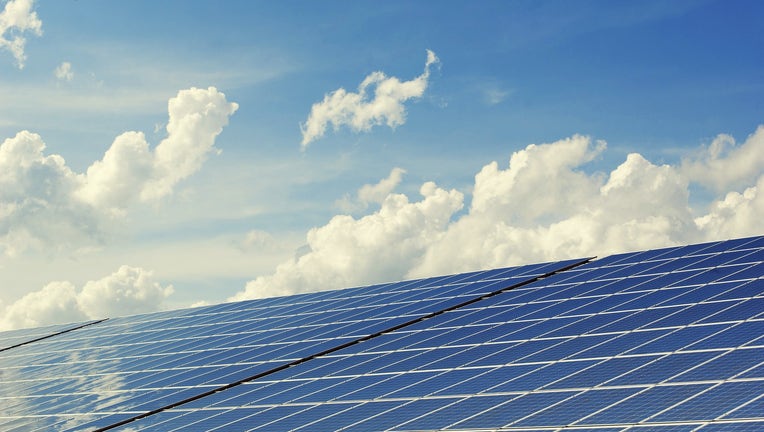Solar power company plans $2.5B Georgia expansion, hiring 2,500 new workers

CARTERSVILLE, Ga. - A South Korean solar panel maker will invest more than $2.5 billion to build factories in Georgia, hiring 2,500 new employees and making components usually manufactured outside the United States, the company announced Wednesday.
Qcells, a unit of Hanwha Solutions, will build a new factory in Cartersville that will employ 2,000 people, with construction starting within weeks and production starting before the end of 2024.
The company also announced a third phase of its Dalton plant, already the largest maker of solar panels in the Western Hemisphere. Qcells will add nearly 500 jobs in Dalton, raising employment above 1,500 once all expansions are complete there.
"We are seeking to further expand our low-carbon solar investments as we lead the industry towards fully American-made clean energy solutions," Qcells CEO Justin Lee said in a statement.
The announcement was celebrated by politicians from both sides of the aisle, with Republican Georgia Gov. Brian Kemp touted the expansion as an example of Georgia setting itself apart as "the No. 1 state for business."
"Combined with our robust logistics infrastructure, top-ranked workforce training program, and collaborative approach, Georgia provides a business-friendly environment that means jobs for hardworking Georgians in every corner of the state and success for both existing and new companies," Kemp said. "We're excited for Qcells' continued success in the Peach State."
Democratic President Joe Biden described the announcement as "a win for workers, consumers, and our climate," saying in a statement that it would provide good jobs, reduce American reliance on other countries for solar components, lower the cost of solar panels and help lower carbon emissions.
The Cartersville plant will fulfill one of the aims of the climate change and health care bill that Biden signed in August.
It included provisions from Georgia Sens. Jon Ossoff and Raphael Warnock, both Democrats, allowing companies making the components used in solar panels to claim tax credits.
The Cartersville plant will assemble solar panels, silicon ingots and wafers as well as solar cells. The company will use polysilicon made at an REC Silicon plant in Moses Lake, Washington. Hanwha last year bought 21% of REC, whose shares are listed in Norway.
Qcells now makes solar modules capable of generating 1.7 gigawatts of electricity each year at the Dalton plant. Following the expansions, the company will make 8.4 gigawatts worth of modules, or about 10,000 solar panels. That will include a capacity of 5.1 gigawatts in Dalton and 3.3 gigawatts in Cartersville.
"My goal remains to make Georgia the world leader in advanced energy production," Ossoff said in a statement.
The company has 750 people working at its existing Dalton factory and Qcells announced plans last year for a second $171 million phase, hiring 470 more workers.
Warnock, Ossoff and Biden administration officials say Biden’s strategy is working to enhance the nation’s manufacturing base as part of the transition to clean energy.
"By 2027, the Qcells expansion is projected to supply about 30% of total U.S. demand for solar panels," Biden clean energy adviser John Podesta told reporters. "I think it’s fair to say that this deal is President Biden’s vision come to life."
The Biden administration says its policy has driven $300 billion in private investment by industries including semiconductors, clean energy, electric vehicles and batteries, with nearly $25 billion of that coming in Georgia. That includes two $5 billion-plus electric vehicle plants, and a $4 billion-plus battery plant announced for Cartersville in December. Hyundai Motor Group is building one of the vehicle plants and is partnering with fellow South Korean firm SK Group to build the Cartersville battery plant.
Georgia economic development officials have particularly promoted electric vehicles and batteries.
"Qcells has long been a pioneer in the solar industry, and it solidified Georgia’s place as a leader in renewable energy and sustainable technology when it cut the ribbon on the largest solar panel manufacturing facility in the Western Hemisphere in 2019," state Economic Development Commissioner Pat Wilson said in a statement.
Biden’s national climate adviser, Ali Zaidi, said U.S. factories are on track to more than quadruple the output of solar panels by 2024, from 7 gigawatts when Biden took office to 33.5 gigawatts. "That’s enough to enable about 5 million homes to switch to clean solar energy each year," Zaidi said.
The total incentive package from state and local governments wasn’t immediately clear. But Qcells could qualify for more than $65 million in state income tax credits, at $5,250 per job over five years, as long as workers make at least $31,300 a year. Local officials have said Qcells workers in Dalton have starting wages of $17 an hour.
The Associated Press contributed to this report.

